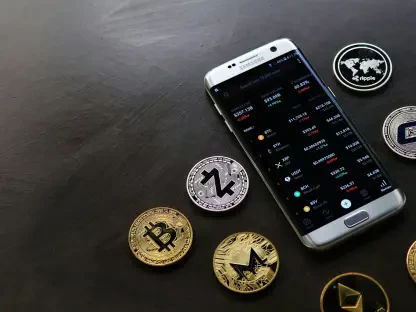The financial landscape is undergoing significant shifts with the introduction of tokenized stocks, a development set to alter the conventional framework of equity trading. eToro’s recent decision to launch tokenized U.S. stocks on the Ethereum blockchain constitutes a pivotal moment in integrating traditional finance with decentralized technology, offering an innovative venture into digital ownership. This initiative leverages Ethereum’s robust infrastructure, aiming to democratize access to the U.S. stock market while offering benefits such as fractional ownership, continuous trading, and enhanced liquidity. By converting stocks into ERC-20 tokens, eToro lowers the entry barriers for retail investors, notably in the case of high-priced stocks, and increases accessibility on a global scale. The convergence of blockchain technology and equity trading marks a critical point where digital assets meet traditional securities in a way that could transform the investment landscape. This article explores the implications of this development, highlighting the potential benefits and challenges it poses for investors and the financial industry as a whole.
The Role of Ethereum in Tokenized Stocks
Ethereum plays a crucial role in this innovation due to its advanced smart contract capabilities. Smart contracts enable transparent transactions, facilitate automated ownership management, and streamline the distribution of dividends, which simplifies complex financial operations. By utilizing these features, eToro seeks to enhance efficiency and reduce the operational burdens traditionally associated with equity trading. The employment of smart contracts allows for a level of automation and transparency that conventional equity trading platforms struggle to replicate, thus offering a more seamless experience for investors. However, the integration of tokenized stocks is not without its challenges, particularly concerning Ethereum’s limitations in terms of scalability and transaction costs. High gas fees could potentially hinder the seamless trading experience that such a system promises, prompting the need for strategic solutions to mitigate these drawbacks. Despite these hurdles, the move toward tokenized securities showcases the potential for blockchain technology to disrupt and improve established financial practices.
Regulatory considerations also emerge as paramount in this landscape. As a regulated entity, eToro emphasizes compliance and security to protect investors and maintain market integrity. The introduction of tokenized stocks must navigate existing securities regulations while addressing concerns over smart contract vulnerabilities. Ensuring a depth of market liquidity and investor protection remains a central focus, with efforts geared towards creating an environment that is both innovative and secure. The interplay between technological advancements and regulatory frameworks will likely dictate the trajectory of tokenized stocks in the financial market. Consequently, these developments reflect an evolving narrative where technological progression is met with a need for robust governance and regulatory oversight. The ability of tokenized assets to function effectively within existing legal structures could be a decisive factor in their broader adoption and success.
Broader Implications and Future Potential
The broader implications of eToro’s move highlight a growing trend of convergence between financial technology and decentralized platforms. As financial institutions explore the integration of tokenized assets into mainstream finance, the prospects for increased efficiency and transparency become increasingly tangible. Tokenization offers not only operational improvements but also reshapes traditional trading practices by allowing operations beyond standard market hours and expediting settlement times. This flexibility provides a more dynamic trading environment that meets the demands of contemporary investors, setting a new standard for market operations.
Investor education presents a pivotal frontier in ensuring the success of such initiatives. As blockchain technology becomes more embedded in financial systems, understanding its nuances becomes crucial for widespread adoption. While initial liquidity for tokenized stocks may be limited compared to traditional markets, strategic efforts to cultivate trading depth will be essential over time. This progression will likely involve targeted educational campaigns and efforts to demystify blockchain concepts for a wider audience, fostering a more inclusive environment for digital asset investment. As the market becomes more receptive to these new formats of asset trading, stakeholders must focus on building trust and ensuring transparency to encourage broader participation in tokenized securities.
Navigating Challenges and Embracing Opportunities
The financial sector is undergoing notable changes with the emergence of tokenized stocks, poised to revolutionize traditional equity trading. eToro’s latest move to introduce tokenized U.S. stocks on the Ethereum blockchain marks a significant step in blending conventional finance with decentralized technology, paving the way for a fresh approach to digital ownership. By exploiting Ethereum’s dependable infrastructure, this innovation aims to democratize the U.S. stock market. It provides perks such as fractional ownership, around-the-clock trading, and improved liquidity. By converting stocks into ERC-20 tokens, eToro reduces barriers for retail investors, especially concerning high-priced stocks, enhancing global accessibility. This integration of blockchain technology with equity trading signifies a pivotal juncture where digital assets increasingly intersect with traditional securities, potentially reshaping the investment landscape. The article delves into the consequences of this shift, focusing on the opportunities and challenges it presents to investors and the broader financial sector.









